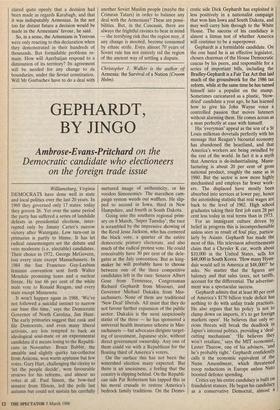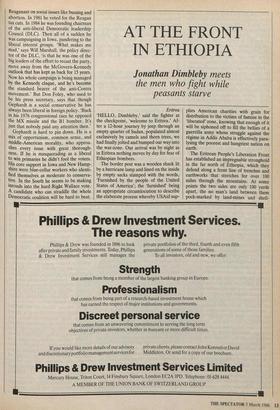GEPHARDT, BY JINGO
Ambrose-Evans-Pritchard on the Democratic candidate who electioneers on the foreign trade issue
Williamsburg, Virginia DEMOCRATS have done well in state and local politics over the last 20 years. In 1969 they governed only 17 states: today they govern 26. Yet over the same period the party has suffered a series of landslide defeats in presidential elections, inter- rupted only by Jimmy Carter's narrow victory after Watergate. Low turn-out in primaries is partly to blame. It has let radical causemongers set the debate and veto moderate (i.e. electable) candidates. Their choice in 1972, George McGovern, lost every state except Massachussets. In 1984 the San Francisco Gay-Lesbian feminist convention sent forth Walter Mondale promising taxes and a nuclear freeze. He lost 66 per cent of the white male vote to Ronald Reagan, and every state except Minnesota.
It won't happen again in 1988. 'We've not followed a suicidal instinct to narrow our base this time,' says the Democratic Governor of North Carolina, Jim Hunt. The early primaries suggest that rank and file Democrats, and even many liberal activists, are less tempted to back an ideological soul-mate or an experimental candidate if it means losing to the Republi- cans in November. Bruce Babbit, the amiable and slightly quirky tax-collector from Arizona, won warm applause but few votes. Gary Hart, challenging the clerisy to let the people decide', won favourable reviews for his reforms, and almost no votes at all. Paul Simon, the bow-tied senator from Illinois, led the polls last autumn but could not sustain his carefully nurtured image of authenticity, or his voodoo Simonomics. The marathon cam- paign system weeds out wafflers. He slip- ped to second in Iowa, third in New Hampshire, and fourth in South Dakota.
Going into the southern regional prim- ary on 8 March, 'Super Tuesday', the race is scrambled by the impressive showing of the Revd Jesse Jackson, who has cornered the black vote, a quarter of the entire democratic primary electorate, and also much of the radical protest vote. He could conceivably have 30 per cent of the dele- gates at the July convention. But as king- maker he will probably have to choose between one of the three competitive candidates left in the race: Senator Albert Gore from Tennessee, Congressman Richard Gephardt from Missouri, and Governor Michael Dukakis from Mas- sachussets. None of them are traditional `New Deal' liberals. All insist that they do not favour further expansion of the public sector. Dukakis is the most suspiciously statist of the three — he has sponsored a universal health insurance scheme in Mas- sachussets — but advocates dirigiste target- ing of investment, Japanese style, without direct government ownership. Any one of them could vie with a Republican for the floating third of America's voters.
On the surface this has not been the watershed election many expected. But there is an uneasiness, a feeling that the country is slipping behind. On the Republi- can side Pat Robertson has tapped this in his moral crusade to restore America's bedrock family traditions. On the Demo- cratic side Dick Gephardt has exploited it less positively in a nationalist campaign that won him Iowa and South Dakota, and may well carry him through to the White House. The success of his candidacy is almost a litmus test of whether America will continue to be a superpower.
Gephardt is a formidable candidate. On the one hand he is an effective legislator, chosen chairman of the House Democratic caucus by his peers, and responsible for a series of important bills, including the Bradley-Gephardt is a Fair Tax Act that laid much of the groundwork for the 1986 tax reform, while at the same time he has turned himself into a populist on the stump. Sometimes caricatured as a plastic, 'blow- dried' candidate a year ago, he has learned how to give his John Wayne voice a controlled passion that moves listeners without alarming them. He comes across as a man perfectly at ease with himself.
His 'everyman' appeal as the son of a St Louis milkman dovetails perfectly with his message that Reagan's bicoastal economy has abandoned the heartland, and that America's workers are being swindled by the rest of the world. In fact it is a myth that America is de-industrialising. Manu- facturing is about 20 per cent of gross national product, roughly the same as in 1980. But the sector is now more highly mechanised and employs far fewer work- ers. The displaced have mostly been absorbed into services at lower pay, hence the astonishing statistic that real wages are back to the level of 1962. High school graduates taking their first job earn 28 per cent less today in real terms than in 1973.
For an immigrant culture driven by belief in progress this is incomprehensible unless seen as result of foul play, particu- larly by Asians. Gephardt has made the most of this. His television advertisements claim that a Chrysler K car, worth about $10,000 in the United States, sells for $48,000 in South Korea. 'How many Hyun- dais would sell in America at $48,000?' he asks. No matter that the figures are baloney and that sales taxes, not tariffs, account for the differential. The advertise- ment was a spectacular success. Gephardt admits that at least 80 per cent of America's $170 billion trade deficit has nothing to do with unfair trade practices. He also argues that his policy is not to clamp down on imports, it's to get foreign markets open'. He believes that only se- rious threats will break the deadlock in Japan's internal politics, providing a 'deal- cutting mechanism'. 'He believes they won't retaliate,' says the MIT economist, Lester Thurow, one of his advisers, 'and he's probably right.' Gephardt confidently calls it the economic equivalent of the Nunn Amendment, which threatened troop reductions in Europe unless Nato boosted defence spending. Critics say his entire candidacy is built on fraudulent stances. He began his candidacy as a conservative Democrat, almost a
Reaganaut on social issues like bussing and abortion. In 1981 he voted for the Reagan tax cuts. In 1984 he was founding chairman of the anti-liberal Democratic leadership Council (DLC). Then all of a sudden he was campaigning in Iowa, pandering to the liberal interest groups. 'What makes me mad,' says Will Marshall, the policy direc- tor of the DLC, 'is that he was one of the big leaders of the effort to recast the party, move away from the McGovern-Kennedy outlook that has kept us back for 15 years. Now his whole campaign is being managed by the Kennedy claque, and he's become the standard bearer of the anti-Contra movement.' But Don Foley, who used to be his press secretary, says that though Gephardt is a social conservative he has always been liberal in foreign policy. 'Back in his 1976 congressional race he opposed the MX missile and the B1 bomber. It's just that nobody paid any attention then.'
Gephardt is hard to pin down. He is a mix of opportunism, common sense, and middle-American morality, who approa- ches every issue with great thorough- ness. If he is masquerading as a liberal to win primaries he didn't fool the voters. His core support in Iowa and New Hamp- shire were blue-collar workers who identi- fied themselves as moderate to conserva- tive. In the South he seems to be making inroads into the hard Right Wallace vote. A candidate who can straddle the whole Democratic coalition will be hard to beat.



















































 Previous page
Previous page